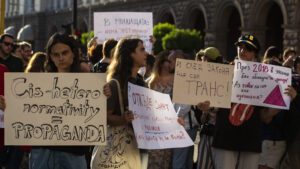In a move that has ignited controversy and drawn international attention, Bulgaria’s parliament has passed a law prohibiting LGBTQ+ propaganda in schools. This legislation, introduced by the far-right, pro-Russian Revival party, has unexpectedly gained support from pro-European Union parties, raising concerns about the state of LGBTQ+ rights in the country. The new law has triggered protests and condemnation from rights groups, highlighting the ongoing struggle for equality and acceptance in Eastern Europe.
The Details of the New Law
The amendment to Bulgaria’s education code, which passed with an overwhelming majority of 159 votes out of 240, prohibits the “propaganda, promotion, or incitement” of LGBTQ+ “ideas and views” in schools. While the law doesn’t provide specific details on what constitutes “propaganda,” its broad language has raised concerns about its potential impact on LGBTQ+ students and education about sexual orientation and gender identity.
This legislation bears a striking resemblance to similar laws passed in Russia and Hungary in recent years, which have been widely criticized for their negative impact on LGBTQ+ rights and visibility. The Bulgarian law’s passage suggests a troubling trend of restrictive measures targeting the LGBTQ+ community spreading across Eastern Europe.
Protests and International Reaction
The passage of the law has not gone unchallenged. Protesters took to the streets outside the parliament building in Sofia, expressing their opposition to the legislation. These demonstrations reflect a growing concern among Bulgarian citizens about the impact of the law on civil liberties and human rights.

International LGBTQ+ rights organizations have also voiced their disapproval. Forbidden Colours, an EU-wide LGBTQ+ rights group based in Belgium, condemned the legislation, describing it as “a direct assault on the fundamental human rights of LGBTIQ+ individuals, particularly children.” The group also expressed concern about Bulgaria adopting tactics from what they referred to as “Russia’s anti-human rights playbook,” highlighting the perceived influence of Russian policies on Bulgarian legislation.
The European Union, of which Bulgaria has been a member since 2007, has yet to take an official stance on the new law. However, a spokesperson for the European Commission stated that the EU’s executive body remains committed to tackling discrimination and challenges faced by LGBTIQ individuals. This situation puts the EU in a delicate position, as it must balance respect for member states’ sovereignty with its commitment to protecting human rights and promoting equality.
Bulgaria’s LGBTQ+ Rights Record and Political Context
The passage of this law comes at a time when Bulgaria already ranks poorly in terms of LGBTQ+ rights protections within the European Union. According to ILGA-Europe, an LGBTQ+ advocacy group that annually evaluates European countries’ LGBTQ+ rights records, Bulgaria ranked third worst in the bloc for LGBTQ+ rights protections in 2024, ahead of only Romania and Poland. This new legislation is likely to further deteriorate Bulgaria’s standing in this regard.
The political context in which this law has been passed is also significant. Bulgaria has been experiencing a period of political instability, with citizens set to head to the polls for the seventh time since 2021. This frequent turnover in government is due to parties’ inability to form a stable coalition following recent elections. The support for this controversial law from both far-right and pro-EU parties suggests a complex political landscape where LGBTQ+ rights have become a contentious issue.
The passage of this law prohibiting LGBTQ+ propaganda in schools represents a significant setback for LGBTQ+ rights in Bulgaria. It raises important questions about the balance between cultural conservatism and the protection of minority rights, as well as the influence of external actors on domestic policies. As Bulgaria continues to navigate its place within the European Union, the international community will be watching closely to see how this law is implemented and what impact it will have on the country’s LGBTQ+ community.
The coming months will be crucial in determining the practical effects of this legislation and whether it will face legal challenges at the national or European level. As seen with similar laws in other countries, the implementation and interpretation of such legislation can have far-reaching consequences for education, freedom of expression, and the overall well-being of LGBTQ+ individuals, particularly youth.
The new law prohibiting LGBTQ+ propaganda in schools in Bulgaria marks a significant moment in the country’s approach to LGBTQ+ rights. It reflects broader tensions within Eastern Europe and the European Union regarding the treatment of sexual and gender minorities. As Bulgaria grapples with political instability and its position within the EU, the international.
For Updates
















